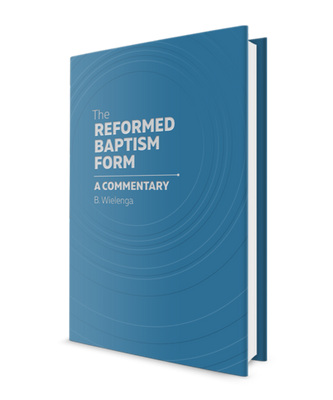Your cart is empty now.
The Reformed Baptism Form: A History from Dordt to today
Throughout the history of the baptism form, there have always been officebearers who attempted to omit parts of the form. These omissions happened in different ways. First, book publishers printed the forms in any way which they saw fit and not according to synodical decisions. Second, ministers regularly skipped parts of the form during the sacrament so that later church printings followed suit (often by placing the “undesirable” section in parentheses and then deleting it altogether without approval). Third, the modern church world has approved a brand-new set of liturgical inventions that have not come from Dordt.
In his book, The Reformed Baptism Form: A Commentary, Bastiaan Wielenga lists several instances where the original form has not been followed. The examples show how violence has been inflicted upon the form.
A book about baptism for people in the pew
Many of us belong to congregations where baptisms occur several times each year. But what is the deeper significance of this sacrament? Why is it important that we witness infant baptism as adult believers?The History of the Reformed Baptism Form (2)
We continue our study of the history of the Reformed baptism form in connection with an RFPA book entitled The Reformed Baptism Form: A Commentary by Bastiaan Wielenga. Our blog post series began with a treatment of the form in connection with Christian education. We then turned to the history of Peter Dantheen and the history of the form. And last time we noticed that the Dutch Reformed in the 1560s and 1570s endured fiery years of persecution at the hands of their cruel Spanish overlords. Many were forced to live in exile outside of the borders of the Lowlands in cities such as Emden and Wesel. In the last blog post, we left off our study of the Reformed baptism form at Wesel in 1568 where several decisions were made concerning the formation of Reformed churches in the Lowlands in the interest of preaching the truth of God’s word.The Reformed Baptism Form: The Author (2)
The origin of the Reformed baptism form can be traced both to England and to the European continent, During the years after the coronation of Bloody Mary in 1553, the pages of church history record the heartrending stories of ruthless persecution and martyrdom of faithful Protestants in England. Many Reformed saints who had first fled from the Lowlands now had to flee for their lives from England to parts of continental Europe.
Thus begins the second part of our story that traces the origin of our Reformed baptism form. In the year 1555, Petrus Datheen became a minister in Frankfurt, Germany at a church that John à Lasco initiated for refugees from the London Refugee Church. Under the gracious hand of God’s providence God again led Datheen to follow John à Lasco for the good of his church. We remember that Datheen would use à Lasco's liturgy to form and craft the beautiful lines of our Reformed baptism form. In Frankfurt the Lord blessed Datheen and his wife with a daughter named Christiana. But this time of peace did not last very long. In 1561 Datheen had to flee again as a Reformed exile, this time because the Lutherans in Frankfurt would not allow a Reformed congregation in their midst.[1]
The Reformed Baptism Form: The Author
Our Reformed baptism form has a glorious history sealed in the fires of persecution. Most church historians agree that the father of the form is Petrus Datheen, a Dutch reformer who lived from about 1531 to 1588.[1] Despite the oppression he and many Reformed believers faced from the Roman Catholic Church, including threats of terrible persecution at the hands of the Spanish Inquisition, Datheen worked tirelessly for the cause of those who loved the Reformed faith both of his own time and those in the generations to come.
As we celebrate the four hundredth anniversary of the Synod of Dordt this year, we focus our attention on one aspect of Datheen’s extensive work as a reformer: the Reformed baptism form, which was approved for use in the Dutch Reformed churches by the great Synod of Dordt.















